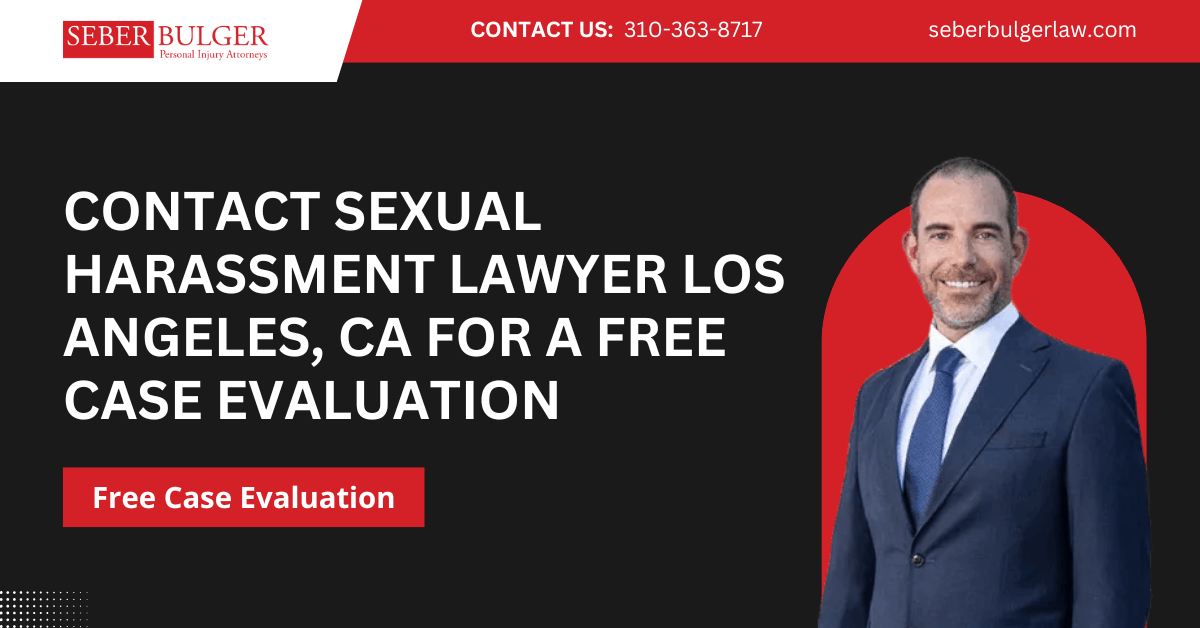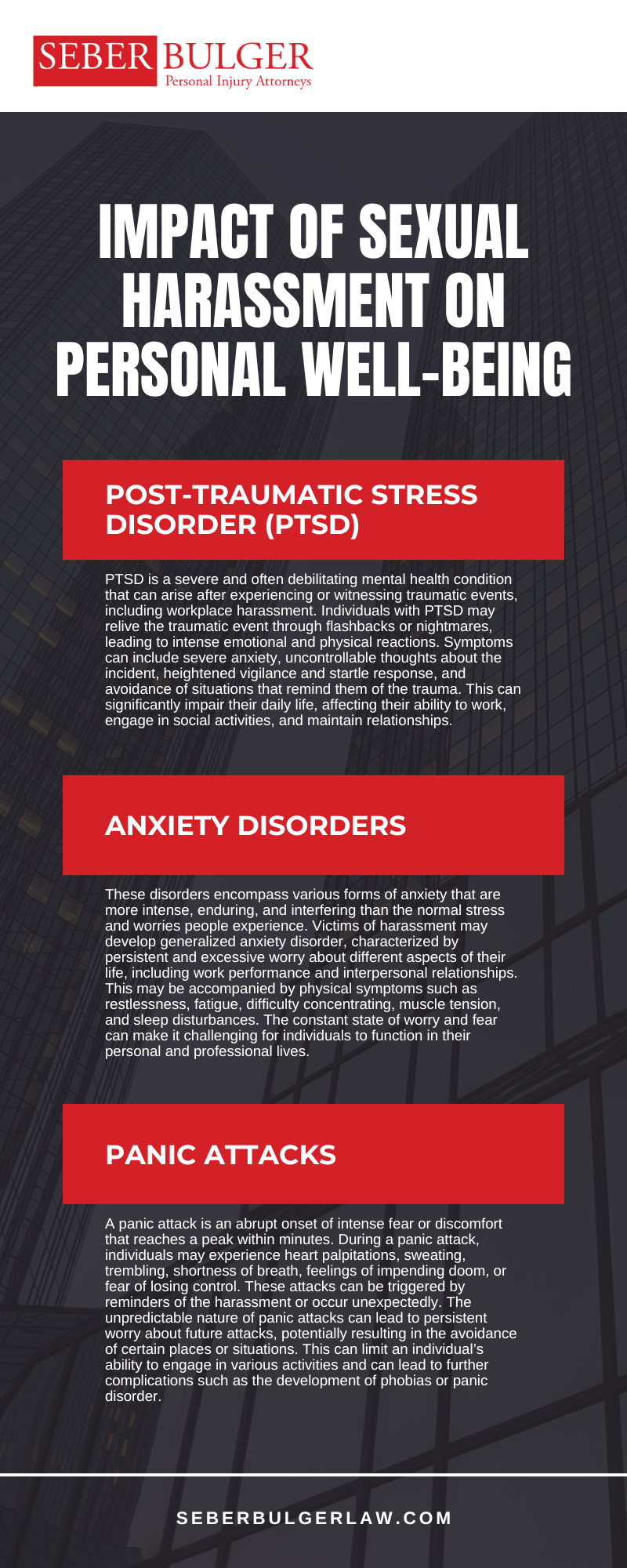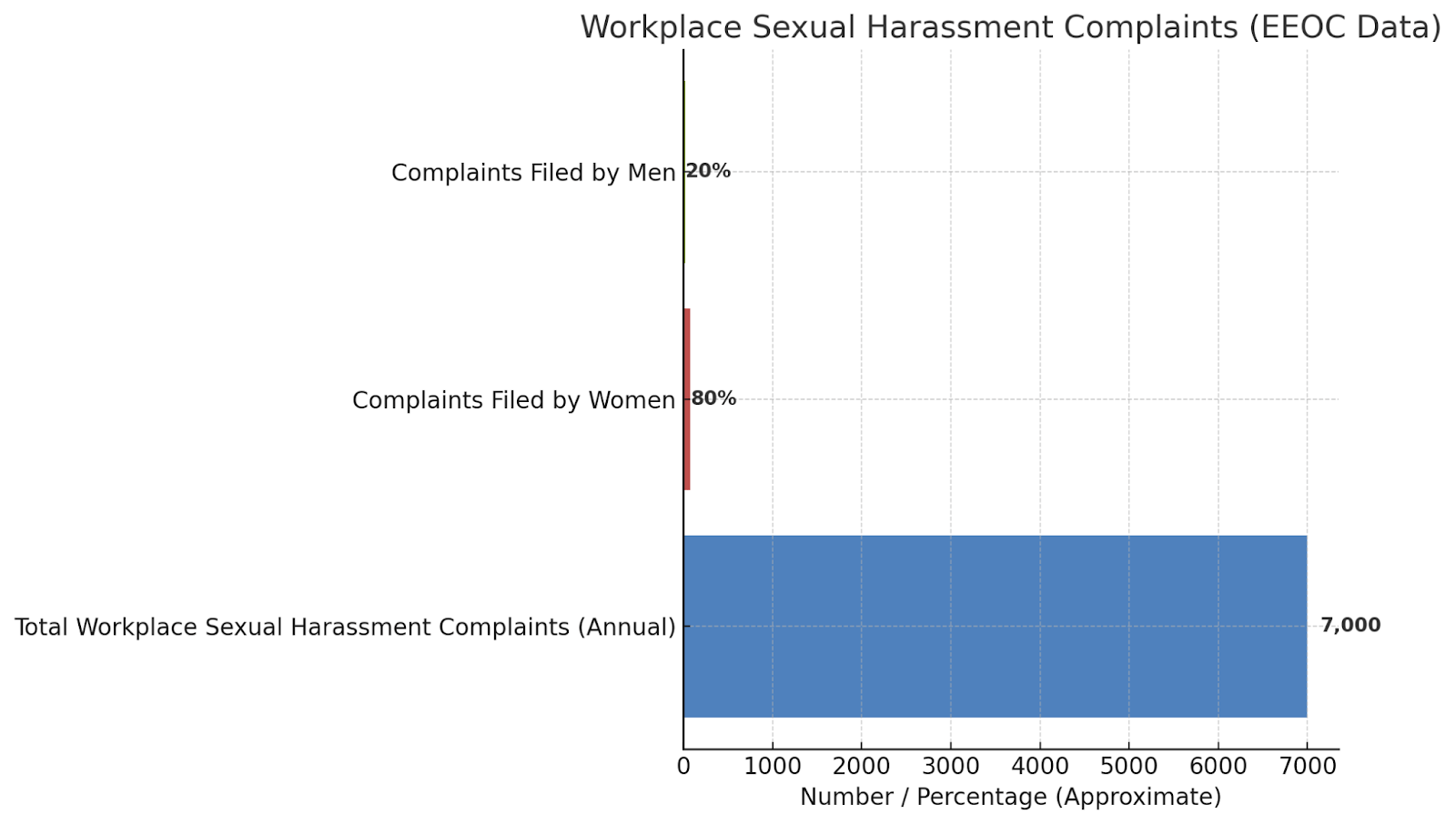Experienced Los Angeles Attorneys
Personal Injury
Employment Law
Sexual Harassment Lawyer Los Angeles, CA
Top Rated Attorneys
Your Dedicated Sexual Harassment Attorney
We hope that you never experience sexual harassment, but if you are, please contact our Los Angeles, CA sexual harassment lawyer for help. You have the right to work in a place that treats you equally and fairly without subjecting you to unlawful discrimination or harassment. Unfortunately, there are some who manipulate their position of power and may not treat you as they should. We understand how this can cause you to feel trapped and anxious and can make your place of work nearly impossible to feel safe in. However, you are not alone. Contact Seber Bulger Law today to schedule a free consultation and learn about how we can help.
Sexual Harassment Laws
Our Beverly Hills attorneys have been practicing for more than two decades combined. We are passionate about what we do. We want victims of sexual harassment to know that we understand the ways in which sexual harassment presents an alarming impediment to equal opportunity and dignity. Misunderstanding or disregarding the severity of sexual harassment can lead to damaging repercussions, both personally and legally.
Sexual harassment is broadly defined as unwanted sexual advances, requests for sexual favors, or other verbal or physical conduct of a sexual nature. The U.S. Equal Employment Opportunity Commission (EEOC) explains that “harassment is illegal when it is so frequent or severe that it creates a hostile or offensive work environment or when it results in an adverse employment decision (such as the victim being fired or demoted).”
Title VII of the Civil Rights Act of 1964, a federal law in the United States, prohibits sexual harassment and considers it a form of sex discrimination. Many states also have laws that heighten the protections outlined in this statute.
The Impact Of Sexual Harassment On Personal Well-Being
The repercussions of enduring sexual harassment extend beyond immediate discomfort, potentially leading to long-term psychological impacts such as:
Post-Traumatic Stress Disorder (PTSD)
PTSD is a severe and often debilitating mental health condition that can arise after experiencing or witnessing traumatic events, including workplace harassment. Individuals with PTSD may relive a traumatic event through flashbacks or nightmares, leading to intense emotional and physical reactions. Symptoms can include severe anxiety, uncontrollable thoughts about the incident, heightened vigilance and startle response, and avoidance of situations that remind them of the trauma.
This can significantly impair their daily life, affecting their ability to work, engage in social activities, and maintain relationships. The lingering effects of PTSD can last for months or years, necessitating professional treatment and support.
Anxiety Disorders
These disorders encompass various forms of anxiety that are more intense, enduring, and interfering than the normal stress and worries people experience. Victims of harassment may develop generalized anxiety disorder, characterized by persistent and excessive worry about different aspects of their life, including work performance and interpersonal relationships. This may be accompanied by physical symptoms such as restlessness, fatigue, difficulty concentrating, muscle tension, and sleep disturbances. The constant state of worry and fear can make it challenging for individuals to function in their personal and professional lives.
Panic Attacks
A panic attack is an abrupt onset of intense fear or discomfort that reaches a peak within minutes. During a panic attack, individuals may experience heart palpitations, sweating, trembling, shortness of breath, feelings of impending doom, or fear of losing control. These attacks can be triggered by reminders of the harassment or occur unexpectedly.
The unpredictable nature of panic attacks can lead to persistent worry about future attacks, potentially resulting in the avoidance of certain places or situations. This can limit an individual’s ability to engage in various activities and can lead to further complications such as the development of phobias or panic disorder. These mental health challenges can significantly impair one’s ability to maintain or secure employment, further exacerbating the situation.
How Our Sexual Assault Lawyer Can Help you
Dealing with a legal matter can be a daunting experience, especially when it comes to sensitive issues like sexual harassment. In such cases, having the right legal representation is crucial. As a respected sexual harassment lawyer team in Los Angeles, CA, we at Seber Bulger Law understand the intricacies of these cases and are dedicated to providing our clients with dedicated, effective legal support.
Your Rights and Legal Options
- Comprehensive Legal Knowledge: We have an in-depth understanding of sexual harassment laws and how they apply to your specific situation. This knowledge is essential for navigating the legal system effectively.
- Personalized Legal Strategy: Every case is unique. We will develop a tailored strategy that aligns with your specific circumstances and goals.
- Gathering Evidence: We will meticulously gather and analyze all relevant documentation, witness statements, and other forms of evidence to strengthen your case.
- Expert Testimonies: In some cases, we may consult with experts to provide testimony, further bolstering your case.
- Courtroom Experience: Our lawyers are seasoned in courtroom procedures and litigation. We will confidently represent your interests, working to ensure that your voice is heard and your interests are protected.
- Negotiating Settlements: If your case can be settled outside of court, we will negotiate on your behalf to reach a fair and just resolution.
Emotional and Professional Support
- Empathetic Guidance: Dealing with sexual harassment can be emotionally taxing. We offer not just legal support, but also understanding and empathy throughout the process.
- Confidentiality and Trust: Your privacy and trust are paramount. We maintain strict confidentiality and provide a safe space for you to discuss your case.
- Calculating Damages: We will help you understand and calculate the damages you may be entitled to, including emotional distress, lost wages, and punitive damages, if applicable.
- Persistent Advocacy: We persistently advocate for your right to fair compensation, whether through settlement negotiations or in court.
Types of Sexual Harassment
Two major types of sexual harassment are identified under Title VII – ‘quid pro quo’ and ‘hostile work environment’:
Quid Pro Quo
Quid pro quo’ (Latin phrase meaning “this for that”) involves situations where employment decisions or treatment are based on submission to or rejection of unwelcome sexual conduct. For instance, if a supervisor threatens to fire an employee unless they go on a date with them, that would qualify as ‘quid pro quo’ harassment.
Hostile Work Environment
On the other hand, a ‘hostile work environment arises when unwelcome sexual conduct unreasonably creates an intimidating or offensive work environment. The conduct must be severe and/or pervasive enough that a reasonable person would find the environment hostile or abusive. Importantly, it’s not just superiors who can create a hostile work environment – peers, subordinates, and even clients can too.
Workplace Sexual Harassment
There are many places that sexual harassment can occur, including workplaces, public spaces and commercial areas. When it occurs, it may involve unwelcome advances, explicit comments, inappropriate touching, or even demands for sexual favors in exchange for job security or opportunities. Such behavior creates a hostile work environment, negatively impacting the mental and emotional well-being of victims.
Street Harassment
Street harassment refers to unwelcome comments, gestures, or actions of a sexual nature that occur in public spaces. It predominantly targets women but can affect anyone. Catcalling, stalking and unwanted touching are just a few examples of this type of harassment. Street harassment perpetuates a climate of fear, limiting individuals’ freedom to move around safely and comfortably.
Cyber Harassment
The rise of technology and social media has unfortunately given way to a new form of sexual harassment known as cyber harassment. Online platforms provide anonymity to harassers, leading to an increase in cases of online stalking, non-consensual sharing of explicit content, revenge porn, and online bullying. Victims of cyber harassment often face severe emotional distress and loss of privacy.
Campus Sexual Assault
Campuses and other educational institutions should be safe and comfortable spaces for students, but cases of sexual harassment still occur. Campus sexual assault encompasses non-consensual sexual activity, ranging from rape to unwanted groping, often perpetrated by fellow students, faculty, or staff. A victims’ physical and emotional well-being is severely affected, generally leading to decreased academic performance, mental health issues, and a compromised sense of safety.
Misconceptions About Perpetrators
One of the most common misconceptions about sexual harassment is that it only involves male perpetrators and female victims. However, the law does not discriminate based on the genders of the individuals involved. Any individual, regardless of their gender, can be a victim or a perpetrator.
If an individual experiences sexual harassment, the first step is typically to address the issue with the person responsible if they feel safe to do so, clearly stating that the behavior is unwanted. Suppose the harassment persists or the individual feels uncomfortable confronting the person directly. In that case, they should report the matter to their supervisor, the Human Resources department, or any appropriate authority within the organization. If that doesn’t lead to an appropriate resolution, it’s time to get our team involved.
Filing a Complaint with the EEOC
In cases where an organization fails to take suitable action to prevent or redress sexual harassment, a victim may opt to file a complaint with a governmental agency. In the U.S., this agency is the Equal Employment Opportunity Commission (EEOC). The EEOC will investigate the complaint and may file a lawsuit on the victim’s behalf or issue a “right to sue” letter permitting the victim to file a lawsuit in court.
It’s also important to note that the law protects individuals from retaliation for reporting sexual harassment or participating in an investigation. When employers ignore that prohibition, our legal team can help.
Important Sexual Harassment Terms
As your Los Angeles, CA sexual harassment lawyers, we aim to provide comprehensive legal support to those facing workplace harassment. Below, we explain key terms often encountered in legal discussions about sexual harassment to help you better understand your rights and options.
- Hostile Work Environment
A hostile work environment occurs when unwelcome sexual behavior or conduct creates a workplace that feels intimidating, hostile, or offensive. This form of harassment must be pervasive or severe enough that a reasonable person would perceive the environment as abusive or hostile. Examples can include inappropriate jokes, repeated unwelcome advances, explicit images, or comments about an employee’s appearance. The impact of such behavior can make it challenging for an individual to perform their job effectively, affecting their mental and emotional well-being.
- Quid Pro Quo
Quid pro quo harassment translates to “this for that” in Latin. It describes situations where employment-related decisions—such as hiring, promotions, or continued employment—are contingent upon an individual agreeing to unwelcome sexual advances or conduct. For example, a supervisor may imply that an employee will receive a promotion in exchange for a date or other personal favor. This type of harassment often involves a power imbalance between the harasser and the victim, and it is strictly prohibited under both state and federal laws.
- Equal Employment Opportunity Commission
The Equal Employment Opportunity Commission (EEOC) is the federal agency responsible for enforcing workplace discrimination laws, including those prohibiting sexual harassment. Individuals who experience harassment at work can file a charge with the EEOC, which will investigate the complaint. If the agency determines that the claim has merit, it may attempt to mediate or settle the matter. If no resolution is reached, the EEOC can issue a “right to sue” letter, allowing the individual to pursue their case in court. The agency plays a vital role in holding employers accountable and promoting fair workplace practices nationwide.
- California Fair Employment And Housing Act
The California Fair Employment and Housing Act (FEHA) offers broader protections against workplace harassment and discrimination than federal laws, ensuring robust safeguards for employees in California. FEHA applies to employers with at least five employees and prohibits harassment based on sex, gender identity, sexual orientation, and other protected characteristics. Unlike federal laws, FEHA allows for claims against individual harassers, not just employers, which can provide additional avenues for justice. California’s strict stance on workplace harassment reflects the state’s commitment to protecting its workforce.
- Compensatory Damages
Compensatory damages refer to financial compensation awarded to victims of sexual harassment for losses they’ve endured. These damages cover areas such as lost wages, diminished benefits, and emotional suffering. For example, if someone leaves a hostile work environment due to harassment, they may receive compensation for lost income and the emotional distress caused by the situation. These damages are intended to restore the victim to the position they would have been in if the harassment had not occurred.
Los Angeles Sexual Harassment Infographic
Sexual Harassment Statistics
According to the U.S. Equal Employment Opportunity Commission (EEOC), there are approximately 7,000 sexual harassment in the workplace complaints filed each year. The majority of those complaints – about 80 percent – are filed by women. If you are a victim of workplace sexual harassment, call our office to find out what legal recourse you may have available to you
FAQS
What constitutes sexual harassment under Los Angeles law?
Sexual harassment in Los Angeles is defined as unwelcome sexual advances, requests for sexual favors, and other verbal or physical conduct of a sexual nature. This can occur in the workplace or in other settings and includes both quid pro quo harassment (where submission to such conduct is used as a basis for employment decisions) and hostile work environment (where such conduct creates an intimidating, hostile, or offensive work environment). It’s important to note that the harasser can be a supervisor, a co-worker, or even a non-employee, and the victim does not necessarily have to be the direct target but can be anyone affected by the offensive conduct.
How do I file a sexual harassment complaint in Los Angeles?
To file a sexual harassment complaint in Los Angeles, you can start by reporting the incident to your employer, human resources department, or another appropriate authority within your organization. If the issue is not resolved internally, you can file a complaint with the California Department of Fair Employment and Housing (DFEH) or the Equal Employment Opportunity Commission (EEOC). It’s crucial to file the complaint within the specified time limits – generally within one year of the harassment occurring. Additionally, consulting with a sexual harassment lawyer can provide guidance on the process and ensure your rights are protected.
Are there specific laws in Los Angeles that protect against sexual harassment?
Los Angeles, like the rest of California, is governed by both state and federal laws that protect individuals from sexual harassment. The primary state law is the California Fair Employment and Housing Act (FEHA), which offers broader protections than federal laws like Title VII of the Civil Rights Act of 1964. FEHA applies to employers with five or more employees and prohibits harassment in the workplace based on sex (including gender, gender identity, gender expression, and sexual orientation) among other protected characteristics. Additionally, Los Angeles may have local ordinances that provide further protections.
What are the remedies available to victims of sexual harassment in Los Angeles?
Victims of sexual harassment in Los Angeles have several potential remedies. These can include, but are not limited to, compensatory damages (such as lost wages and benefits), emotional distress damages, punitive damages (to punish severe misconduct), and injunctive relief (such as reinstatement to a job or policy changes in the workplace). Each case is unique, so the specific remedies will depend on the circumstances of the harassment and the impact it has had on the victim.
How can a lawyer assist in a sexual harassment case in Los Angeles?
A lawyer specializing in sexual harassment cases can provide invaluable assistance in several ways. They can help you understand your rights, the merits of your case, and the legal options available to you. They can also assist in gathering evidence, preparing and filing legal documentation, representing you in negotiations or court proceedings, and advocating for the best possible outcome in terms of compensation and other remedies. Having a knowledgeable lawyer can make a significant difference in the success of your case and the relief you receive.
Sexual Harassment Glossary
Los Angeles, CA sexual harassment lawyer support is crucial when workplace harassment affects your safety, dignity, and ability to work. Below, we provide clarity on five important legal terms often involved in sexual harassment claims. These definitions are grounded in real legal application, meant to help individuals in California understand how the law works in these cases. By learning these terms, victims and their advocates can take informed action.
Hostile Work Environment
This term refers to workplace conditions made intolerable due to repeated or severe unwelcome behavior of a sexual nature. These behaviors can include verbal remarks, gestures, or physical contact that contribute to a setting that feels threatening or humiliating. To qualify as a hostile work environment, the conduct must go beyond occasional inappropriate comments—it needs to be pervasive or egregious enough that a reasonable person would consider the workplace abusive.
In many cases, the offender is not just a supervisor. Coworkers, subordinates, and even customers can be responsible for creating this atmosphere. Courts often evaluate whether the actions were frequent, whether the victim asked for the behavior to stop, and whether the employer took reasonable steps to correct the issue. Hostile work environments do not require tangible employment actions like firing or demotion to be unlawful under California or federal law.
Quid Pro Quo Harassment
Quid pro quo harassment arises when employment decisions are tied to an employee’s response to sexual conduct. For example, a manager might suggest that a promotion is contingent upon going on a date. If the employee refuses and is penalized, that may constitute quid pro quo harassment. The key factor here is the presence of a power dynamic and the connection between job benefits and unwelcome sexual conduct.
This form of harassment is considered particularly serious because it involves direct coercion using workplace authority. While less frequent than hostile work environments, it’s easier to prove in court when evidence shows an explicit demand for sexual favors in exchange for work-related benefits or threats.
Equal Employment Opportunity Commission (EEOC)
The EEOC is the federal agency that enforces laws against workplace discrimination, including sexual harassment. Employees who experience harassment can file a charge with this agency. The EEOC will investigate the case and determine whether there is reasonable cause to believe discrimination occurred.
The process may lead to mediation or a formal lawsuit filed by the EEOC. If not, the agency may issue a “right to sue” letter, allowing the individual to take the case to federal court. Filing a charge with the EEOC is a critical step in the legal process and typically must occur within 300 days of the incident in California. Legal counsel can help ensure this step is handled properly.
California Fair Employment And Housing Act (FEHA)
This state law extends protections beyond federal regulations. FEHA applies to all California employers with five or more employees and prohibits harassment based on sex, gender identity, gender expression, or sexual orientation, among other protected categories.
Unlike federal law, FEHA allows victims to sue not only their employer but also individual harassers. This expanded liability framework makes it a powerful legal tool for harassment victims in Los Angeles and throughout California. The law also protects individuals from retaliation for reporting harassment or participating in an investigation. Under FEHA, victims may file a complaint with the California Civil Rights Department (CRD) before pursuing civil action.
Compensatory Damages
In sexual harassment cases, compensatory damages refer to the financial reimbursement awarded to victims for losses caused by the harassment. These can include lost income from missed work, therapy costs, and emotional pain. While punitive damages are meant to punish bad behavior, compensatory damages are designed to restore the victim to their pre-harassment financial and emotional state.
When calculating these damages, lawyers consider evidence such as medical records, employment history, and testimony. It’s essential to document the impact of harassment thoroughly, including symptoms like anxiety, depression, and sleep loss. The more complete the evidence, the more effectively a case for compensation can be built.
We at Seber Bulger Law believe that every employee deserves a safe, respectful work environment. If you’ve experienced harassment at work, you have legal rights and protections available to you. Let us help you move forward—contact our office today for a free consultation with a Los Angeles, CA sexual harassment lawyer.
Seber Bulger Law, Los Angeles Sexual Harassment Lawyer
280 S Beverly Dr Suite PH, Beverly Hills, CA 90212
Contact Our Firm Today
Seber Bulger Law is here to support you throughout your sexual harassment case in Los Angeles. Our experienced sexual harassment lawyers will provide personalized guidance, advocate for your rights, and help you seek justice. We understand the sensitive nature of these cases and are committed to ensuring you receive the compensation you deserve. We secure millions for our clients every single year. Contact us today so that we can listen to your case and provide you with the support and guidance that you deserve.
Personal Injury Practice Areas
Client Review
Hello Self!
- Locations Served
- Beverly Hills
- West Hollywood
- Santa Monica
- Venice
- Silver Lake
- Culver City
- Greater Los Angeles
- Inglewood





